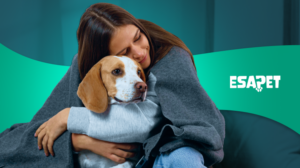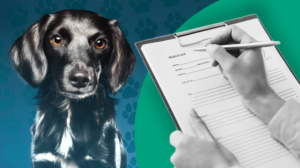What Animals Can Be Emotional Support Animals?

Animals have always provided a great support system for humans. With the many health and mood-boosting benefits of pets, many people find themselves using animals as coping mechanisms to navigate through the challenges of life. In fact, caring for a dog, cat, or other animals can help to relieve symptoms of depression and anxiety and improve heart health.
This is where emotional support animals come into the equation. An emotional support animal (ESA) is an animal that provides relief to people with a mental or emotional disability. They can offer comfort, companionship, friendship, and emotional support during difficult times.
Emotional support animals come with powerful health benefits and can help us cope with the different struggles and obstacles. However, emotional support animals are different from service animals. They have distinct requirements, qualifications, and processes to apply.
In this article, we discuss what animals can be emotional support animals and how you can get a legitimate ESA letter.

What are the best Emotional Support Animals?
There are no specific rules to what animals can be emotional support animals. To get an ESA, you simply need to have a qualifying mental health condition or psychiatric disability. You then have to get a letter from a licensed mental health professional. This will make your animal a legitimate ESA.
Still, some qualities make certain animals better emotional support animals.
Some of the qualities of a perfect ESA include:
- Easy-going and social
- Loving and affectionate to its owner
- Intelligent and intuitive
- Encourages playfulness and exercise
- Obedient and willing to learn.
- Good temperament and well-behaved in social settings
Here are some of the best emotional support animals:
Dogs

Dogs have been providing emotional support long before people acknowledged emotional support animals. Dogs are one of the most loyal companions, providing their owners with comfort, joy, affection, and more. The lasting bond between a dog owner and a dog is unmatched.
Dogs have all the qualities and personality traits of a perfect ESA. They are intelligent, gentle, social, and easy-going. Dogs have evolved to be acutely attuned to humans and their behavior. Some emotional support dogs can learn how to read human emotions and respond accordingly.
While all pets can help to reduce stress, ease loneliness, and improve symptoms of anxiety and depression, dogs are especially good at this. They provide a sense of security and valuable companionship.
Some breeds of dogs make for better ESAs than others. The best breed types for emotional support dogs are Golden Retrievers, Havanese, Poodles, Maltese, Great Danes, Labrador Retrievers, Irish Wolfhounds, German Shepherds, and Corgis. These breeds rank high because they have a natural affection and loyalty toward their owners.
Simply put, dogs qualify as very good emotional support animals. If you have a dog and you would like to make it an emotional support pet, then simply get an ESA letter.
Cats

Cats also make great emotional support animals. Cats are extremely soothing and calming. The companionship of a cat can offer comfort, help to ease anxiety, and build confidence for people who are anxious about going out into the world.
Cats are also intelligent, calming, and quiet creatures. Stroking them at the end of a difficult day can help to lower cortisol levels. This will have a positive impact on your overall mental health and emotional well-being. Many cat owners have attested to the mental benefits of owning a cat and how much it helps them cope with the difficulties of everyday life.
Because of their small size, Cats are easy to care for and ideal for children and older adults. Their fluffy fur makes them great for cuddling, which can elevate positive emotions and feelings to help you counter any negative feelings like anxiety or depression. You can even train cats to perform specific tasks, similar to service animals.
While any breed can become an emotional support animal, certain ones are better than others. Some of the best breeds for emotional support cats are Russian Blue, Manx, Siamese, Sphynx, and Abyssinian. Additionally, Exotic Shorthair, American Bobtail, Burmese, Persian, and Maine Coon make great ESAs. All of these breeds are docile and loving, helping them bond with their owners.
Ferrets

Many people overlook ferrets as emotional support animals. However, ferrets are great for emotional support, comfort, and companionship. They are playful, entertaining, mischievous, and have a feel-good personality that will brighten your day.
It’s important to have an emotional support ferret that has these qualities and personality traits. For example, your ferret should be social, easy-going, attentive, entertaining, quiet, intelligent, and interactive.
They can even be house-trained to use the litter box and keep your space clean. As a result, ferrets are becoming popular options for emotional support animals, therapy animals, and comfort animals.
Many therapists have reported breakthroughs using emotional support ferrets, especially with treatment-resistant mental disorders. For people whose disabilities make it impossible to care for larger animals, ferrets are a great substitute. They do not require much space and have little-to-no maintenance requirements.
Rabbits

Rabbits are not only cute and cuddly but can also be great emotional animals. Emotional support rabbits provide support and companionship to individuals suffering from various mental health conditions. These playful and curious little animals bond quickly with their owners.
They are undeniably adorable, with their fluffy bunny ears and twitching noses. Playing with these animals will boost your mood and improve your mental health.
Further, rabbits are able to see, hear, and smell things that most humans can’t. These powerful traits give them the ability to respond quickly to oncoming dangers and harmful situations.
Rabbits are great emotional support animals because they are loving, gentle, quiet, and trainable. They are small and do not take up too much space. Plus, rabbits have relatively long lives compared to rats and ferrets, which is excellent for someone who wants to keep them for a long time.
If you find comfort in rabbits, but don’t want to go through the hassle of keeping them in your home, you can also visit animal sanctuaries and farms. This way you can interact with these lovely animals and get the support you need.
Parrots
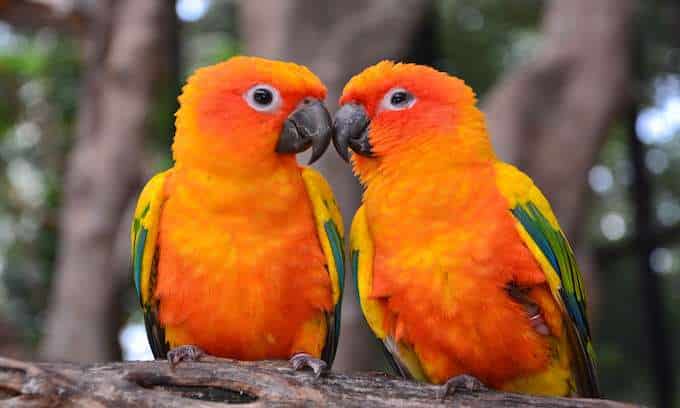
Parrots are an impressionable bird species. They are highly empathetic and naturally attuned to the emotional environment surrounding them. Further, parrots are very intelligent and can sense tension, stress, anger, and even depression in their owners.
This level of intuition makes them perfect emotional support animals. You can even train them to use these instinctual abilities to help people suffering from emotional and psychological disabilities.
Parrots are also very social animals. They are likely the only breed that can mimic human sounds after hearing them only once. This makes parrots ideal for people suffering from anxiety and post-traumatic stress disorder.
Since they are extremely smart and can sense the emotional mood of their owners, parrots can be trained to learn phrases that will calm their owners. Simply put, parrots are capable of grasping phrases that can soothe an agitated and worked-up individual.
Some of the best parrot breeds for ESAs include the African Gray Parrots, Cockatiels, and Budgies.
Miniature Pigs

Yes, even miniature pigs can be emotional support animals! They are actually one of the best emotional support animals and great therapy animals.
Miniature pigs are playful, intelligent, and very in tune with their owner’s mood and behavior. Additionally, miniature pigs can provide a sense of happiness and companionship. They are fun to be around and are often a great source of joy and fun for children.
Pigs are also very social animals and can help you meet new people. Pig owners frequently stop and talk to each other on walks, hikes, or during events centered around pigs. This can help you to start and maintain new friendships.
Pigs are especially effective therapy animals for kids with autism. They can be used as a component of the treatment plan. For example, kids who have autism often have trouble with vocalization. As therapy animals, pigs can help these kids gain self-confidence to express speech utterances and word verbalization. They can even provide a calming effect when the kids start to experience erratic behavior.
They can also alert owners about oncoming seizures, ease the symptoms of panic attacks and seizures, and even detect low blood sugar levels.
The Vietnamese Pot-Bellied Pig and the Kunekune are some of the best emotional support miniature pigs.
Miniature Horses and Ponies
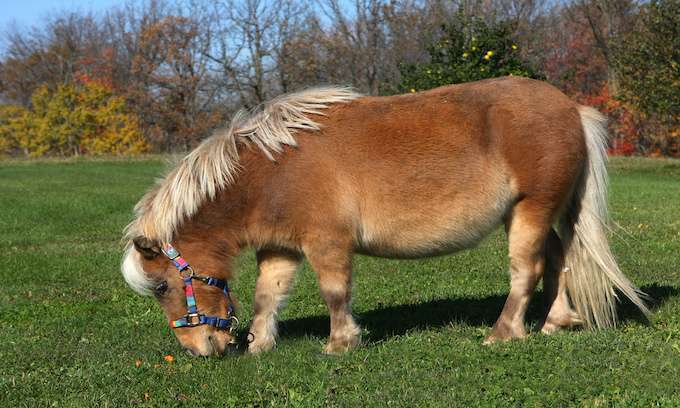
Ponies and miniature horses may seem like an odd choice for an emotional support animal. But, they are actually excellent at offering comfort, companionship, and emotional support. Plus, they’re really cute.
For people going through a lot mentally and emotionally, horses can provide an outlet to escape those overwhelming thoughts. They will give you an excuse to go outside and get some fresh air. Furthermore, bonding and interacting with horses in a friendly environment can have a calming effect on the individual.
Miniature horses have loving and affectionate personalities. They are also gentle, curious, friendly, and calm.
Horses are often in animal-assisted therapy to help individuals suffering from depression, anxiety, schizophrenia, dementia, post-traumatic stress disorder (PTSD), attention deficit disorder (ADHD), and people who fall on the autism spectrum. Both ponies and miniature horses also help to support people with learning disabilities and critical illnesses.
Goats and Sheep
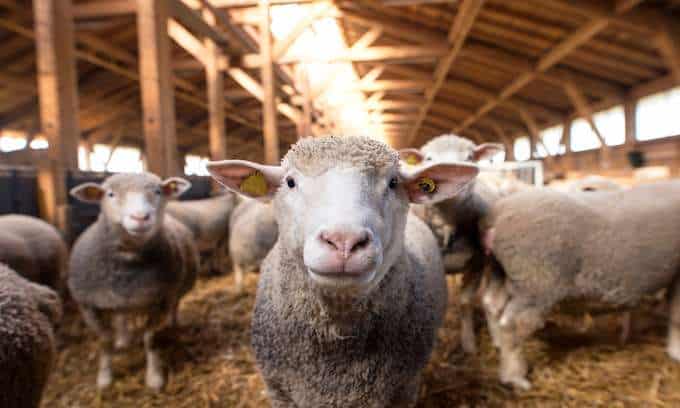
While goats and sheep are not conventional emotional support animals, they are surprisingly great candidates. Goats and sheep can recognize human faces and are capable of reading human emotions. This makes them an excellent choice for an emotional support animal.
If you have ever interacted with goats or sheep, you know that they love interacting with people. Goats and sheep are also very intelligent animals. This means that you can train them to do a lot of things and perform certain tasks. It is best to start training them when they are still young, so they grow up knowing how to do these tasks.
These animals are generally quiet and calm around people unless something specific agitates them. They are typically very friendly and like to be petted and eat out of people’s hands.
Some of the best breeds of goats that would make great emotional support animals include Nigerian Dwarf Goats, Mini Alpine Goats, Nubian Dwarf Goats, Pygmy Goats, and much more. A Shetland or Cheviot sheep would work great as well.
Llamas and Alpacas

Llamas and Alpacas are especially popular emotional support animals in various countries across South America, such as Peru and Brazil.
When brought up around humans, llamas and alpacas can grow to be gentle, empathetic, and friendly. They generally have quiet and reserved personalities, but their faces light up when they see their owners. These animals also have very soft coats. When you pet a llama, you can also stroke your troubles away.
Many people think llamas have a sixth sense when it comes to the emotions of their owners. This means that they are highly capable of easing emotional distress and relieving other symptoms of a mental health condition.
Unlike llamas, alpacas are generally smaller and more approachable and friendly. Llamas can appear quite intimidating to people who are not used to them. However, both are good for animal-assisted therapy. For people who are afraid of larger animals, it’s best to stick to an alpaca.
These animals also have funny facial expressions and personalities that can bring joy to their owners. A well-trained llama or alpaca can be relatively calm and quiet, especially around children and senior citizens. They are naturally gentle, empathetic, and have exceptionally soft fur coats.
Conclusion
Emotional support animals are not limited in the same ways as service animals. ESAs can be any breed or type of animal. The only requirement is that you get a prescription from a licensed mental health professional.
It’s still important to consider all options available, so you can make an informed decision on the best breed that will serve you. For example, if you have allergies, a golden retriever may not be the best emotional support animal for you. Instead, get a hypoallergenic breed that will not trigger your allergies, like Goldendoodles or Yorkies.
While an emotional support animal will certainly care for you emotionally, you also need to care for them. Do not get a high-maintenance ESA. A healthy and happy emotional support animal will better serve you.
If your emotional and mental well-being depends on an emotional support animal, do not hesitate to get one!
